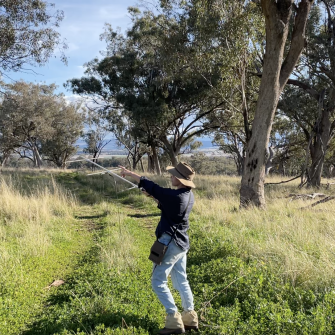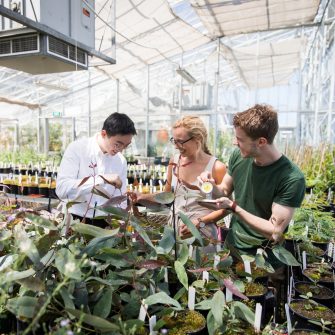Graduate Certificate in Child Development
- Commencing Terms
- Hexamester 2
- Duration
- 1 year
- Delivery Mode
- Online
- Campus
-
Kensington
- Codes
- Program code 7419
- CRICOS code -
-
2024 Indicative first year full fee
- $28,500*
-
2024 Indicative full fee to complete degree
- $28,500*
-
2024 Indicative first year full fee
- $39,500*
-
2024 Indicative full fee to complete degree
- $40,500*

- Overview
- Entry requirements
- What will I study?
- Future careers
- How to apply
- Fees & Scholarships
Overview
The Graduate Certificate in Child Development gives professionals from non-psychology backgrounds specialised skills to apply psychological principles to their work with children, improving outcomes for children with diverse needs. If you work in education, nursing, juvenile justice, social work or any other field involved with young people, this program will give you a highly-valued suite of psychological skills.
The Graduate Certificate in Child Development is a unique offering in Australia. Delivered entirely online, it will equip you to apply an evidence-based approach to your work with children. You will gain an understanding of typical - compared to atypical - child development; age-appropriate capabilities and performance expectations; factors that influence attention, learning, and memory; the development, management and treatment of common childhood disorders; and factors that promote well-being and resilience.
As the program is delivered online, it is suitable for students who prefer to study in a flexible format, balancing study with work and other commitments. It also offers an introduction to the study of psychology that may lay the groundwork for further higher education in psychological sciences. This program runs on the UNSW online hexamester calendar.
Key features
- Flexible study
This program is fully online, allowing you to study when and where suits you. Part-time delivery means that you can study while you work.
Why study at UNSW?
Study with the best
The UNSW School of Psychology is one of the best in Australia. We're ranked 30th in the world and 2nd in Australia for psychology*, attracting award-winning staff and offering excellence and innovation in our teaching. The School of Psychology has strong links with professional practitioners in the areas of clinical, neuropsychological and forensic psychology.
Learn from industry-leading educators
You come to university to learn from the experts – researchers who are leaders in their fields, striving to create new knowledge. The School of Psychology is well known for its research tradition. Many of our staff have international reputations in their respective fields and a number are Fellows of the Australian Academy of Social Sciences. Our staff attract several million dollars in external research funds per year. Our staff publications receive more citations than any other psychology department in Australia and we have one of the highest rates of PhD graduations in psychology of any Australian university. We earn more competitive research funding and publish more Tier 1 journal articles per academic than any other psychology school in Australia.
*QS Subject Ranking 2024
Want to see more from UNSW Science?
Entry requirements
For entry into this program, you must hold either:
- an Australian bachelor’s degree (or equivalent) in any discipline
- a higher university qualification (Graduate Diploma or above)
Minimum entrance requirements for admission to UNSW Sydney also apply.
English language requirements
You may be asked to provide evidence of your English proficiency to study at UNSW depending on your educational background and citizenship. English language skills are vitally important for coping with lectures, tutorials, assignments and examinations - this is why UNSW requires a minimum English language competency for enrolment.
If you do need to provide evidence of your English proficiency, this will be indicated in your application. You can prove this by providing evidence that you meet one or more of the following criteria:
- English language tests and university English courses
- Prior study in the medium of English
- Other qualifications
UNSW Global offers courses and programs designed to help you reach the English language level required for entry into your chosen degree. Different options are available depending on your current English language level. Learn more.
For entry into this program, you must hold either:
- an Australian bachelor’s degree (or equivalent) in any discipline
- a higher university qualification (Graduate Diploma or above)
Minimum entrance requirements for admission to UNSW Sydney also apply.
English language requirements
You may be asked to provide evidence of your English proficiency to study at UNSW depending on whether you are from an English-speaking background or non-English speaking background. English language skills are vitally important for coping with lectures, tutorials, assignments and examinations - this is why UNSW requires a minimum English language competency for enrolment.
If English is not your first language, you’ll need to provide proof of your English proficiency before you can be given an offer to study at UNSW. You can do this by providing evidence that you meet one or more of the following criteria:
- English language tests and university English courses
- Prior study in the medium of English
- Other qualifications
If you need to improve your English skills before you start your degree, UNSW College’s Academic English Programs are for you. The programs are suitable for various English levels and help you prepare for university studies and life in Australia.
Check the specific English language requirements for this program
Program structure
The Graduate Certificate in Child Development will provide graduates of disciplines outside psychology with an opportunity to gain specialised professional knowledge and practical skills to apply psychological principles to their work with children. The program will augment the existing skills of professionals working in education, acute care facilities, child and family services, and allied health to improve outcomes for children with diverse needs in their care.
Full program structure
Students must complete 36 Units of Credit (36 UOC) as a standalone program.
This program consists of 6 core courses, each course is worth 6 UOC. Students must complete all 6 courses to be awarded the Graduate Certificate. Each course will be delivered 100% online for 6 weeks. There are 6 hexamesters per year.
- Students must complete the introductory courses (PSYC5111, PSYC5112) before proceeding to the intermediate courses (PSYC5113, PSYC5114).
- Students must complete the intermediate courses (PSYC5113, PSYC5114) before proceeding to the advanced courses (PSYC5115, PSYC5116).
- At each stage (introductory/intermediate/advanced), students may complete the two courses in the same stage in either order, according to what suits their individual pattern of study, subject to courses availabilities.
- Students who have completed course/s equivalent to PSYC5111 and/or PSYC5112 and/or PSYC5113 as part of prior degree within 7 years prior to program commencement, may apply for Recognition of Prior Learning (RPL) in the online application. RPL is also known as “credit transfer” or “advanced standing”.
- To be considered for credit transfer, please answer ‘yes’ for the question on whether you are seeking credit in your online application and upload the official transcripts as well as the official course outlines of the completed courses that you believe are equivalent.
- Students can enrol in a maximum of one course per hexamester.
- The maximum time to complete the program is 10 years.
For more information on program progression and course details, please visit the School of Psychology website.
Future careers
The Graduate Certificate in Child Development will provide students with specialised knowledge of developmental science and skills which can be applied in various professional and allied health contexts. The program will augment the existing skills of professionals working in education, acute care facilities, child and family services, and allied health professionals to improve outcomes for children with diverse needs in their care and is a pathway for further learning.
How to apply
Applications must be submitted through our Apply Online portal. We encourage you to submit your completed application as early as possible to ensure it will be processed in time for your preferred start. You will indicate the hexamester in which you wish to commence as part of the application. Please note the intake for this program is Hexamester 2 only (see Key Dates for the application deadline).
If you wish to be considered for credit transfer, you can indicate this within your application. If you’re applying for credit you will need to upload the official transcripts as well as the official course outlines of the completed courses that you believe are equivalent in addition to the other required supporting documents.
Successful applicants will be emailed an offer letter which specifies the commencing hexamester and dates. If the session you are applying for has reached full capacity, you will be issued an offer to commence in the next available session. Ensure you accept your offer online and enrol into your courses by the relevant deadlines.
Ready to start your application?
Applications must be submitted through our Apply Online portal. We encourage you to submit your completed application as early as possible to ensure it will be processed in time for your preferred start. You will indicate the hexamester in which you wish to commence as part of the application. Please note the intake for this program is Hexamester 2 only (see Key Dates for the application deadline).
If you wish to be considered for credit transfer, you can indicate this within your application. If you’re applying for credit you will need to upload the official transcripts as well as the official course outlines of the completed courses that you believe are equivalent in addition to the other required supporting documents.
Successful applicants will be emailed an offer letter which specifies the commencing hexamester and dates. If the session you are applying for has reached full capacity, you will be issued an offer to commence in the next available session. Ensure you accept your offer online and enrol into your courses by the relevant deadlines.
Ready to start your application?
Fees & Scholarships
$10,500*
$10,500*
All places within this degree are Commonwealth supported. This means that if you receive an offer from UNSW Sydney as a domestic student, you will have a substantial proportion of your fees subsidised by the Australian government. Start your application today with our guide on how to apply.
Please note the information below applies to students who have opted for domestic fee-paying places.
*The indicative Commonwealth Supported Place (CSP) fees are an estimate based on the relevant student contribution band/s for a Commonwealth Supported Place undertaking a standard full-time load of 48 units of credit per year (1 Equivalent Full Time Student Load/1 EFTSL). To find out more about Commonwealth Supported Places visit Postgraduate Commonwealth Support.
Indicative fees are a guide only and have been calculated based on the typical enrolment patterns of students undertaking the degree/program. The indicative fee listed here is an estimate for tuition only and excludes non-tuition fees and charges. The amount you pay will vary depending on the calendar year of enrolment, the courses you select and whether your study load is more or less than 1 Equivalent Full Time Student Load (48 units of credit (UOC) per year).
You should not rely on indicative fees as fee increases are assessed when required and may exceed the indicative figures listed here. Actual fees are calculated on enrolment. More information on fees can be found at the UNSW fees website.
*Fees are subject to annual review by the University and may increase annually, with the new fees effective from the start of each calendar year. The indicative fees listed here are based on an estimated average and are for tuition only, other fees and charges are not included. The amount you pay will vary depending on the calendar year to enrol, the courses you select and whether your study load is more or less than 1 Equivalent Full Time Student Load (8 courses per year).
Indicative fees are a guide for comparison only based on current conditions and available data. You should not rely on indicative fees. More information on fees can be found at the UNSW fees website.
Indicative fees to complete the program have been calculated based on a percentage increase for every year of the program. Fee increases are assessed annually and may exceed the indicative figures listed here.
Indicative fees to complete the program include tuition plus an estimate of study-related costs of approximately $1,000 per year. To find out more about other costs, visit UNSW International.
Scholarships
At UNSW, we award over $83 million in scholarships each year. We pride ourselves on rewarding excellence and making university accessible to students from all walks of life. Whether you’re a domestic or international student, our range of scholarships, prizes and awards can support your journey.

QS World University Rankings, 2025.

AFR Top 100 Future leaders Award.

#1 Australian uni attended by start-up founders.






